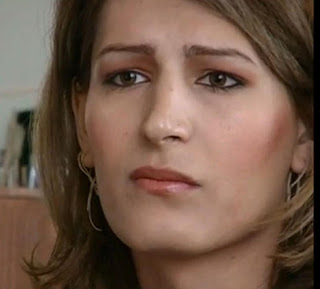سایه ترانس سکسوئل ایرانی در تورنتو خودکشی کرد و به زندگی خود خاتمه داد.
سایه را در فیلم روز تولد دیدیم. با آرزوهایش آشنا شدیم.
سایه یک خانواده میخواست. یک شغل میخواست و مادر بزرکی که به خانه اش برود و در کنار او چای بنوشد.
سایه بدن مردانه اس را دوست نداشت. سایه را خانواده اش طرد کرد. سایه از فضای هموفوب و خفقان آلود ایران گریخت تا در جهانی دیگر آرامش یابد.
در ترکیه هورمون درمانی را آغار کرد و سپس به کانادا رفت.
در کانادا در تنهایی و در نبرد با جامعه میزبان دیگر تحمل نکرد… او در آنجا مورد حمایت یک تهاد کلیسایی مدافع همجنسگرایان بود.
زبان انگلیسی نمیدانست و به نظر می آید در آنجا هم ار حمایت و همدردی جامعه ایرانی برخوردار نبود.
مرگ سایه هشداری مجدد است به اذهان منجمد و عقب مانده ای که همچنان بر مناسبات و اخلافیات دگرجنس گرایانه (اجباری) پای فشرده و حقوق دیگران را به اشکال مختلف نقض میکنند.
سایه رفت. مبارزه ما علیه هموفوبیا، ترانس فوبیا باید که گسترش یابد. این را به سایه و خودمان بدهکاریم.
متن خبر به زبان انگلیسی:
(اگر دوستی فرصت ترجمه متن را داشته باشد، ممنون خواهیم شد که متن را ترجمه و منتشر یا در اختیار ما قرار دهد.
shadiAshadi@gmail.com
Source: Toronto Star
By David Graham
A simple stone marker recessed into the lawn at Scarborough’s Bethel Pioneer Memorial Cemetery is the sole, drab reminder of a handsome 28-year-old Iranian man who was only just starting to transform into a woman when he died.
Atrian escaped a brutal life with an abusive father in Iran, then suffered cruel taunts in another Muslim country when she sought asylum in Turkey.
But it was in Toronto that she became unravelled, overwhelmed and unable to find peace. On July 22, 2008, the coroner was called to her small downtown apartment.
Atrian, who loved her smokes and the odd night out at George’s Play, the famous Church St. drag bar, had killed herself.
Born Kazemi Hassanali Mehmandost, Atrian began presenting himself as a girl while still a boy.
According to close friends, Atrian started hormone treatments in Turkey after fleeing Iran, and hoped to complete her physical transformation in Canada. But Atrian, who also went by the nicknames “Sayeh” and “Ali-Reza,” was broke. And she was frustrated with Canada’s lengthy protocol for sex-change surgery.
Because she often said she didn’t want to die as a man, her grave marker bears the nickname she used in Toronto: Atrian. She was just 28 when she died.
Friends and supporters still struggle to understand why Atrian found life in Toronto so difficult. For two years, they rarely spoke about her.
It was the Anglican United Refugee Alliance and Toronto’s Metropolitan Community Church that supported her here, the first refugee that MCC, known as Toronto’s gay church, had ever sponsored. The congregation was anxious for her to succeed.
They found her a place to live at the YMCA-sponsored Sprott House, an old mansion on Walmer Rd. used mostly as a home for street youth. She also had a support team who rallied around her, even finding a therapist who spoke Farsi.
A year later, they were searching for a funeral parlour, a gravesite and a stone marker, the things necessary to honour a life at a price they could afford.
This September Brian Brenie, a member of Atrian’s primary care team at MCC, broke the silence that had surrounded her brief life and death in Toronto.
“We felt a lot of pain,” said Brenie. “We all wondered if we could have done better. I know I did the best I could.”
Brenie describes Atrian as very tall, with remarkably clear skin.
“She passed easily as a woman though she often wore gloves because she felt her hands gave her away,” he said. “She was reserved and very quiet, mostly, I think, because her English wasn’t good.”
She once boarded a plane to return to Iran, but changed her mind before the doors closed, said Brenie.
Atrian’s friends still struggle to understand how someone who survived a lifetime of cruelty and rejection in Iran and Turkey could choose to end her life while safe in Toronto.
Some suggest too many years of self-loathing growing up in Tehran left her psychologically damaged. Her family had difficulty accepting her as a woman. And she hated her male body.
Brent Hawkes, the pastor at MCC, recalled being struck by a question Atrian asked on her first day in Toronto.
“She asked me to tell her what streets in Toronto are safe for her to walk on,” he said.
Hawkes recalled an anguished conference call to Atrian’s family in Tehran.
“In one sense they wanted her body back, their son and brother to bury in his homeland,” Hawkes said. But the family was also concerned about trying to bring back a refugee who had fled the country’s repressive Muslim regime.
It would have been expensive to fly her body back, and it was money they didn’t have.
Everyone in Canada who knew Atrian knew she did not want to be buried as a man. In the end, she was laid to rest in women’s clothing.
The MCC took a break from sponsorship after Atrian’s suicide. But within months they embraced another refugee, who has been in Toronto for more than a year.
Hawkes said his church will continue to work with these people, particularly those who will benefit from the unique support his congregation can offer.
“Some are so damaged by the trauma they’ve experienced, that you can never do enough. But you don’t know that till you go through it.”
Related articles
- Gay refugees in limbo in Turkey (thestar.com)
Tags: همجنسگرایی
